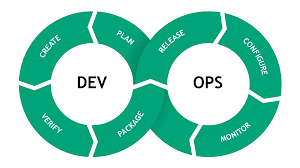Unlocking the Power of DevOps in Modern Software Development
The Role of DevOps in Modern Software Development
DevOps has emerged as a crucial methodology in the world of software development, bridging the gap between development and operations teams to streamline the delivery of high-quality software products. By integrating key practices and tools, DevOps aims to enhance collaboration, automate processes, and accelerate the pace of development cycles.
Key Principles of DevOps
DevOps is built on several core principles that guide its implementation:
- Automation: Automating manual tasks to increase efficiency and reduce errors.
- Collaboration: Fostering a culture of collaboration between development and operations teams for seamless workflow.
- Continuous Integration/Continuous Deployment (CI/CD): Implementing CI/CD pipelines to automate software delivery processes.
- Monitoring and Feedback: Utilizing monitoring tools to gather feedback and improve performance continuously.
- Infrastructure as Code (IaC): Managing infrastructure through code to ensure consistency and scalability.
The Benefits of DevOps
Implementing DevOps practices offers numerous benefits for software development teams:
- Rapid Delivery: Shortening development cycles and accelerating time-to-market for new features.
- Improved Quality: Enhancing software quality through automated testing and continuous integration.
- Innovation: Encouraging innovation by fostering a culture of experimentation and learning.
- Reliability: Increasing system reliability through automated monitoring and feedback mechanisms.
- Efficiency: Improving operational efficiency by automating repetitive tasks and workflows.
The Future of DevOps
In an increasingly competitive digital landscape, the adoption of DevOps is becoming essential for organizations looking to stay ahead. As technology evolves, DevOps will continue to play a pivotal role in shaping the future of software development, enabling teams to deliver value faster, more reliably, and with higher quality.
5 Essential DevOps Tips for Streamlining Software Development
- Automate repetitive tasks to increase efficiency.
- Implement continuous integration and continuous deployment practices for faster delivery of software.
- Use version control systems to track changes and collaborate effectively with team members.
- Monitor system performance and logs to identify issues early on.
- Encourage communication and collaboration between development and operations teams for smoother workflows.
Automate repetitive tasks to increase efficiency.
Automating repetitive tasks is a key principle in DevOps software development that significantly boosts efficiency. By automating routine processes such as testing, deployment, and configuration management, teams can save valuable time and resources, allowing them to focus on more strategic and creative aspects of software development. This not only speeds up the delivery of software but also reduces the likelihood of human errors, leading to higher quality products. Embracing automation in DevOps empowers teams to work smarter, faster, and more effectively towards achieving their development goals.
Implement continuous integration and continuous deployment practices for faster delivery of software.
Implementing continuous integration and continuous deployment practices in DevOps software development is key to achieving faster delivery of software. By automating the process of integrating code changes and deploying them to production environments, teams can streamline their development cycles and ensure that new features and updates are delivered quickly and efficiently. This approach not only accelerates time-to-market but also enhances overall software quality by enabling frequent testing and feedback loops, ultimately leading to more responsive and agile development processes.
Use version control systems to track changes and collaborate effectively with team members.
Utilizing version control systems in DevOps software development is crucial for tracking changes and facilitating seamless collaboration among team members. By implementing a robust version control system, developers can easily manage code changes, track revisions, and revert to previous versions if needed. This practice ensures that all team members are working on the most up-to-date codebase, promotes transparency in the development process, and enables efficient collaboration by providing a centralized platform for sharing and reviewing code modifications. Ultimately, leveraging version control systems enhances productivity, reduces errors, and fosters a cohesive team environment in the DevOps workflow.
Monitor system performance and logs to identify issues early on.
Monitoring system performance and logs is a critical tip in DevOps software development. By regularly tracking key metrics and analyzing log data, teams can proactively identify potential issues before they escalate, allowing for timely intervention and resolution. This proactive approach not only helps maintain system reliability and performance but also contributes to a smoother development process by addressing issues early on, minimizing downtime, and ensuring a seamless user experience.
Encourage communication and collaboration between development and operations teams for smoother workflows.
Encouraging communication and collaboration between development and operations teams is a fundamental tip in DevOps software development. By fostering open dialogue and teamwork between these traditionally siloed departments, organizations can achieve smoother workflows, faster problem resolution, and enhanced overall efficiency. When developers and operations staff work together seamlessly, they can align their goals, share knowledge effectively, and collectively drive the success of software projects from inception to deployment. This collaborative approach not only improves productivity but also promotes a culture of shared responsibility and continuous improvement within the organization.



